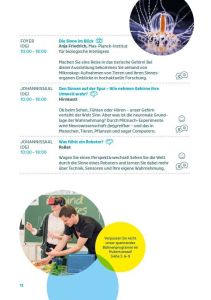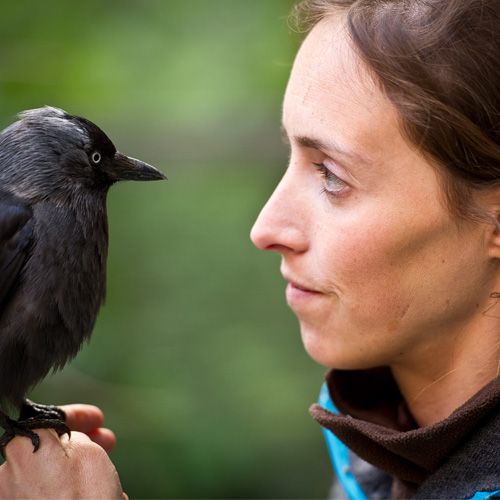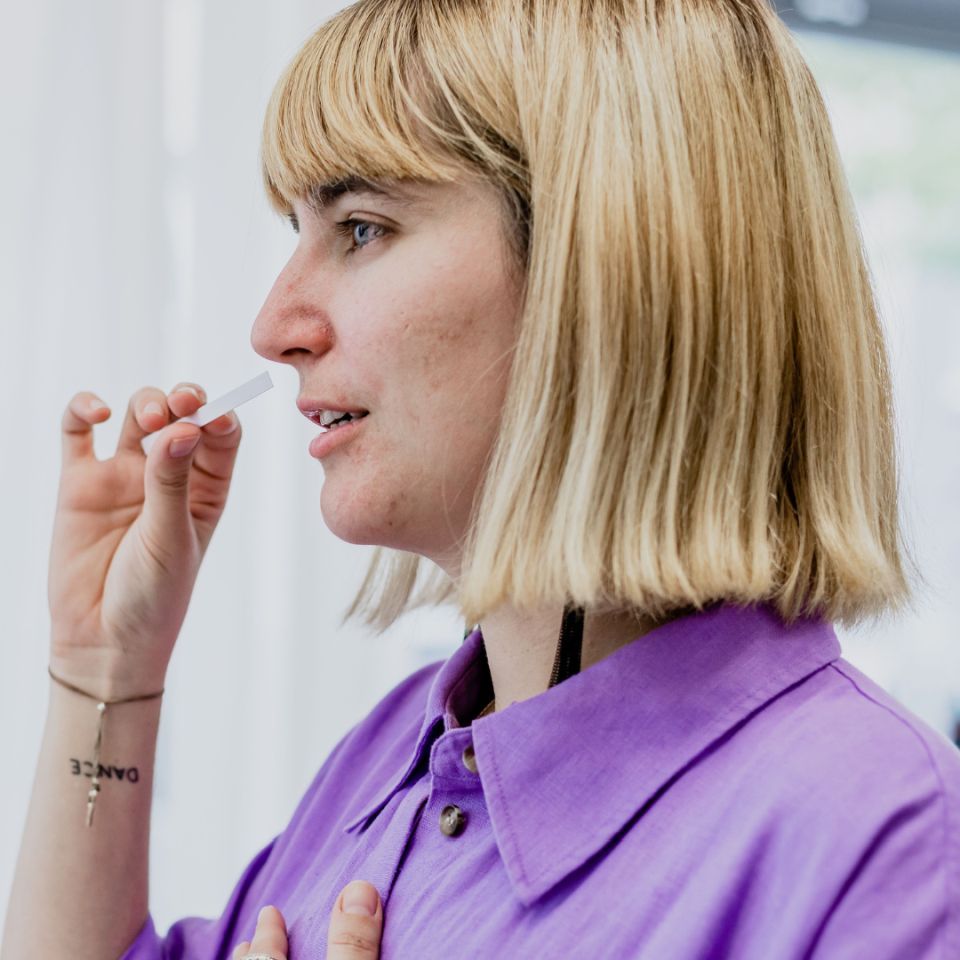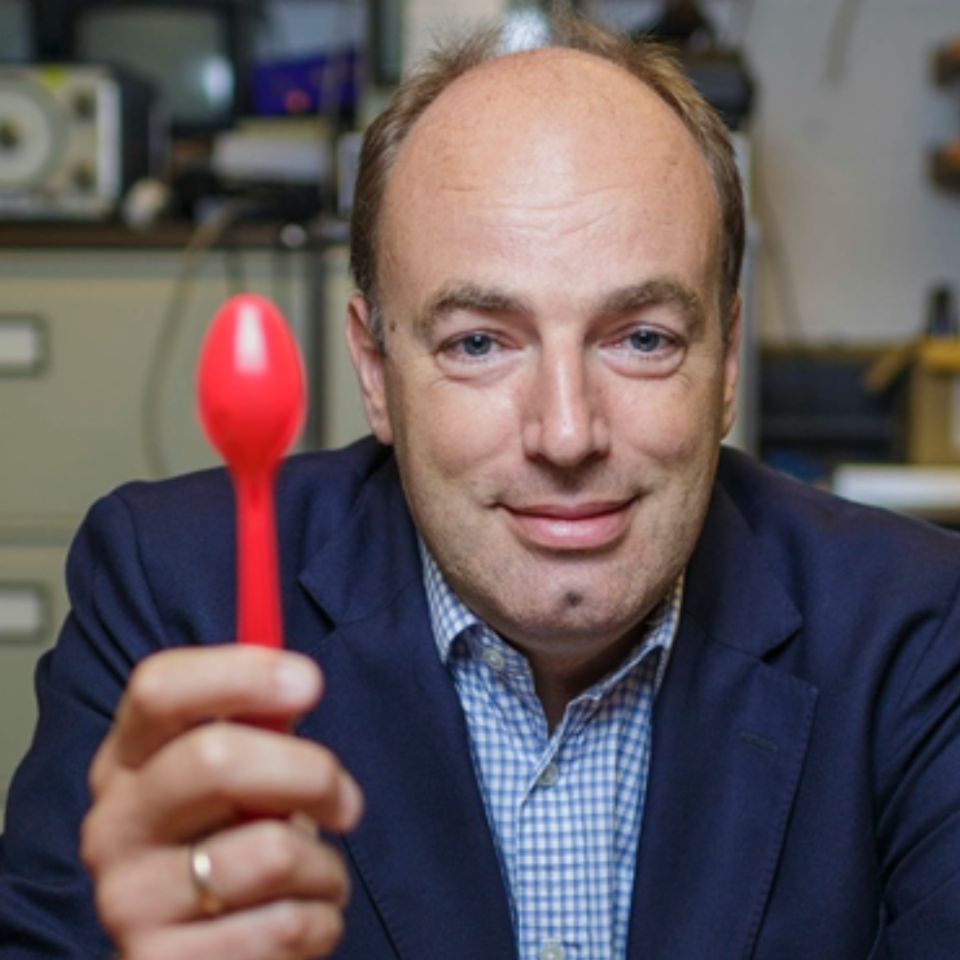
BIOTOPIA Festival about senses, perception and change of perspective took place on October 1 and 2, 2022.
Under the motto "The Power of Perception", an exciting program awaited the festival guests at four locations: Where are the biological origins of musical senses? How do mobile robots perceive their environment? And what do optical illusions reveal about our brain?
BIOTOPIA Festival SENSE 2022 - A great success
Over 7,000 guests saw "The World Through Different Eyes!"
- Learn, experiment, marvel: Festival gave a foretaste of the emerging BIOTOPIA in Munich-Nymphenburg
- 105 contributors from science, art and education, 241 participants and more than 50 volunteers
You missed a talk on our SENSE stage?
You will find all video recordings
of our stage program here soon!
You missed a talk on our SENSE stage?
You will find all video recordings
-

Ed Yong: The Incredible World of Animal Senses
with German and English subtitlesEd Yong, science journalist and author in conversation with Michael John Gorman (BIOTOPIA) about the incredible world of animal senses. They discuss how animals perceive the world, what humans can learn from animals, how we change our behavior in consequence and how we can better protect the animals by understanding their senses. Join us and explore the power of animal perception!
Watch on Youtube -

Jackie Higgins: Exploring the Animal Kingdom Reveals Our Secret Senses
with German and English subtitlesJackie Higgins, wildlife documentary director and author in conversation with Samara Rubinstein (BIOTOPIA), exploring numerous marvels and extraordinary stories of the sentient world in zoology. They are holding up a mirror to better understand what we can learn from animals and how we humans relate to them.
Watch on Youtube -

Jonathon Keats: Recipes for Climate Adaptation
with German and English subtitlesTasting Tomorrow: Jonathon Keats, experimental philosopher and artist, about the challenges we are facing in the future, regarding climate change and food - especially creating traditional recipes in a changing environment in future generations. Which substitutes will we be growing in different climatic regions in the future, in order to maintain our heritage foods?
Watch on Youtube -

Ophelia Deroy & Charles Spence: Surprising Sensory Connections
with German and English subtitlesOphelia Deroy (Ludwig-Maximilians-Universität München) and Charles Spence (University of Oxford) talk about surprising sensory connections, fascinating associations many people experience and explore extraordinary questions like: Can you taste shapes or feel colors?
Watch on Youtube -

Alex Jordan: The Seismic World of Spiders
with German and English subtitlesAlex Jordan, scientist at the Max Planck Institute of Animal Behavior, shows us the fascinating sensory world of spiders, including their dangerous liaisons, surprising team-work and elaborate building techniques. Highlights of his research include the delicate interaction between spiders and their webs, as well as their sophisticated form of seismic sensing. And did you know, that spiders also have REM-sleep?
Watch on Youtube -

Harald Luksch: Where do I look if I don't know what I'm seeing?
[in German]Harald Luksch, neurobiologist at the Technical University of Munich, gives us new insights into the world of vision in this exciting lecture. Under the title "Seeing as a complex performance of the brain" he shows us amazing and funny phenomena of the sense of sight, both in humans and in animals. What to do if we don't know exactly what we're looking at?
Watch on Youtube -

Conny Kopp-Scheinpflug: Tuning out - Hearing at older age
with English subtitlesHow does our sense of hearing change over the course of our lives? How is hearing loss in old age related to dementia? Conny Schopp-Kleinpflug from the Biocenter at the LMU in Munich explains why we have to learn how to locate sound sources as children and how we find it increasingly difficult to perceive high frequencies as we get older. She also has some very useful tips to help us keep our hearing fit for as long as possible!
Watch on Youtube -

Stefan Leutenegger: How do mobile robots perceive their environment?
[in German]Robotics expert Stefan Leutenegger shows how robots find their way around their environment, how they react to changes and how they can learn to interact with their surroundings and people. He also explains that machines follow similar principles in such complex tasks as, for example, we humans do when we move through the world.
Watch on Youtube -

Anna Vogeler: Dancers of the night: How bats orient themselves
[in German]Bats are fascinating creatures! Also in terms of their sensory perception. Anna Vogeler from the Coordination Office for Bat Protection Southern Bavaria takes us into a world of the night, where seeing with your ears is quite normal, smelling of fish and pee is sexy and where vampires donate blood to each other.
Watch on Youtube -

Étienne Serbe-Kamp: The flytrap asks the mimosa: "Do we have senses?"
[in German]Do flytraps and mimosas have brains? Étienne Serbe-Kamp from the Max Planck Institute for Biological Intelligence shows us here how much our senses are similar to those of plants and that plants also have the same action potentials as we do. Mimosa and flytrap react a bit slower than we do, but that is also due to the different demands we have. And can Venus flytraps really count?
Watch on Youtube -

Daniela Sammler: Concert of Neurons: Biological Origins of Musical Senses
[in German]Musicality is more deeply rooted in our biology than previously thought. Daniela Sammler from the Max Planck Institute for Empirical Aesthetics explains to us that our sense of tact is already predictable in our genes and that this anchoring in biology may be the reason why everyone in this world has and makes music. But how are we more like cockatoos than monkeys?Watch on Youtube -

Martin Heß: A fish sees something you don't see
[in German]Does the anchovy see better than us? In this interesting lecture, Martin Heß, zoologist at the Ludwig-Maximilians-University in Munich, shows us how anchovies are able to recognize their food better and what advantages it has to be able to perceive polarized light. Observe the exciting effect that a polarizing filter can have on our perception!Watch on Youtube -

Thomas Wachtler: Can we trust our senses? What optical illusions reveal about our brain
[in German]How do optical illusions come about and why do they make so much biological sense? In this interesting lecture, Thomas Wachtler from the Ludwig-Maximilians-Universität Munich takes us on an exciting journey into the world of the phenomena of our sense of sight and our optical perceptions. Is it so easy to trick our brain, or are these important perceptual abilities under natural conditions?Watch on Youtube -

Juan Ruiz: Seeing with your ears! Theory and practice of echolocation
[in German]Seeing with your ears? Yes it's possible, as Perceptual Mobility trainer Juan Ruiz proves in this presentation. He is blind and relies on echolocation instead of his eyes, like a bat! Thanks to years of practice, he can easily orient himself using his clicking sounds, move through rooms without bumping into objects, and even recognize the texture of different materials!Watch on Youtube -

Jonathon Keats: What if Slime Molds Ruled the World?
with German and English subtitlesIn this fascinating thought experiment, experimental philosopher Jonathon Keats and Tanja Seiner (BIOTOPIA) take us into the world of slime mold and how they can help us find optimal decisions for political and socieological scenarios. Jonathons Keats' experiments have revealed interesting answers to challenging questions of our time, like border control and climate change. Can we learn from slime molds how to optimize the political decision making processes?
Watch on Youtube -

Eckhart Nickel: Art as multi-sensual seduction: reading from the novel "Spitzweg"
[in German]The author Eckhart Nickel takes us on an impressive literary journey into the world of sensory perception and sharpens our senses and our understanding of our self-image in this impressive reading from his current novel "Spitzweg". In conversation with Anna-Lisa Dieter, he shows us how dealing with art and literature can represent a retreat from the present and the digital world.Watch on Youtube -

Timo Feldhaus: The Year Without a Summer: Reading from "Mary Shelleys Zimmer"
[in German]In this reading from his bestseller "Mary Shelleys Zimmer", author and journalist Timo Feldhaus takes us into the world after a climate catastrophe that drastically changed the summer of 1816 and not only the climate, but also art and literature, bas well as it influenced the sensory perceptions of people around the globe.Watch on Youtube -

Mendoza Quintero & Wichmann: We make it tasty! Whiskey and AI
with German subtitles (language DE and EN alternating)How to measure, understand and improve the taste of whiskey with artificial intelligence? Paulyna Mendoza Quintero and Christoph Wichmann from the Max Planck Institute of Biochemistry explain this to us in this delicious lecture. When does the sense of taste develop in humans and can one train one's sense of taste? Exciting questions about the taste and the origin of the aromas in whiskey are vividly explained here. Immerse yourself in the world of scents, aromas and tastes!
Watch on Youtube -

Podium: Rothenberg, Sammler, Strack, Ullrich & Mauch: Good Vibrations.
with German and English subtitlesInteresting, musical and moving podium discussion about "Good Vibrations. Music, Sound and Nature." with live performances to sounds from nature by David Rothenberg. Are animals artists and do they have aesthetics? These and many other exciting questions regarding music, sound and nature are put up to discussion in this panel with scientists from different disciplines.
Watch on Youtube -

Cosmo Sheldrake: A Polyphonic Wake-up Call
with German and English subtitlesWith songs from his new album “Wake Up Calls” and improvised pieces, multi-instrumentalist and composer Cosmo Sheldrake draws our attention to the loss of biodiversity. His music consists largely of recordings of the songs of endangered birds. He adds in further natural sounds such as bioelectric recordings of fungal networks and plant root systems and hydrophone recordings of local waterways to create a truly polyphonic performance. Come reflect on the magnificent soundscapes that surround us before many of these voices become extinct!
Watch on Youtube

On the stage in the Hubertus Hall of Schloss Nymphenburg, scientists from the Max Planck Society, TUM and LMU Munich, among others, gave insights into their current research on the sensory perception of different species. Biologist Anna Vogeler, for example, showed how bats orient themselves.
Nature filmmaker and author Jackie Higgins took the audience on a journey through little-known corners of the animal kingdom - including the star-nosed mole with its amazing sense of smell - and gave them a glimpse of the potential that unconsciously resides in us humans as well. And the Malaysian-British science journalist and Pulitzer Prize winner Ed Yong also took the audience on a journey into the incredible world of animal senses, the subject of his book "An Immense World," and raised awareness of the importance of good science education.




The sound spectrum of Mother Nature - from birdsongs to stridulation sounds of grasshoppers to bioelectrical recordings of fungal webs and plant root systems - was heard during the musical evening program with biologist and musician Dominik Eulberg on Saturday and multi-instrumentalist and composer Cosmo Sheldrake on Sunday.
The fully booked themed tours for the senses in the Botanical Garden on flowers and their pollinators as well as exotic aromatic and spice plants were also very popular. The numerous hands-on stations in the BIOTOPIA Lab, in the Museum Mensch und Natur and in the castle courtyards were particularly popular: See the world through the eyes of "dichromats" - in yellow and blue. The color design and poster for the festival were also yellow and blue. All in all, an eye-catcher.
Get lost in the multisensory labyrinth and find yourself again. Create your own scent compositions from aroma molecules and oils. Explore the "scent alphabet" of Helmholtz Zentrum München. Play feel-memory and make a kaleidoscope. See the sensory organs of ticks under the microscope.
With more than 60 program points at the four locations, young and old alike got their money's worth. And the living chameleon, which provided the motto "Seeing the world through different eyes", was very popular.

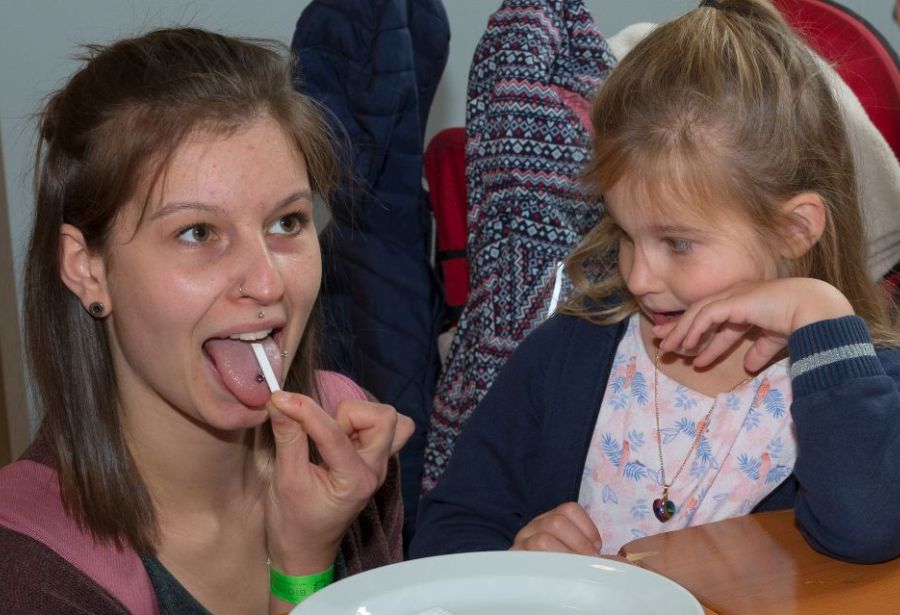








The BIOTOPIA Festival 2022
SENSE - The Power of Perception
How does our perception work? Which senses do we have in common with animals, plants or even single-celled organisms? How can we change, expand, improve or even discover new senses for us? During the Corona pandemic, many people experienced first-hand how strongly the loss of taste and smell, or the restriction of human communication affected our lives.
The BIOTOPIA Festival "SENSE" explores the sensory world in the context of science and society. At the interface of bio- and neuroscience, art and design, the festival brings the world of perception to life in a variety of formats: a diverse stage program, exhibitions, talks, demonstrations and work- stores, hands-on science, live performances as well as exciting hands-on activities invite curious people of all ages to get active, discuss, ask questions and get answers.
Dive with us into
the adventure of perception
and see the world through different eyes!
the adventure of perception
and see the world through different eyes!
Festival Facts
4 festival venues,
2 event days,
over 60 program points and countless sensory experiences... Free entry
Date:
1. & 2. October 2022
All day:
Stage program 10am-9pm, hands-on program 10am-6pm
Venues:
Hubertussaal,
Schloss Nymphenburg,
Museum Mensch und Natur,
Botanischer Garten and
BIOTOPIA Lab
Questions about the festival:
Festival FAQ
This email address is being protected from spambots. You need JavaScript enabled to view it.
#BiotopiaSinne
Stage program
in the Hubertus Hall, Nymphenburg Palace (1st floor)
Hands-on program
on the entire festival grounds: Schloss Nymphenburg, Museum Mensch und Natur, BIOTOPIA Lab and Botanical Garden Munich-Nymphenburg.
Further information
Press releases
Here you can find press information about the festival:
Speakers, performers, contributors
Some program highlights were selected by a jury of experts in the course of an open call. We would like to thank the members of the jury:
Gordon Cheng
Institute for Cognitive Systems, TUM
Ophelia Deroy
Philosophy of Mind, LMU
Michael John Gorman
Founding Director BIOTOPIA & Life Sciences in Society, LMU
Jens Hauser
Art Curator and Media Studies Scholar
Andreas Heinecke
Founder Dialogue Social Enterprise GmbH
Ilona Grunwald Kadow
Neuronal Control of the Metabolism, TUM
Partners and Supporters
-
Prof. Dr. Michael John Gorman, Founding Director of BIOTOPIA - Naturkundemuseum Bayern
We are delighted that this year's BIOTOPIA Festival will give all curious people the opportunity to discuss and experience the fascination of perception – and to do so with exciting partners from science and art. Very recently, the Corona pandemic has shown how much the loss of the sense of smell and physical contact affects our existence. By understanding the rich sensory world of other animals, we can gain new perspectives on human perception, that is the goal of BIOTOPIA´s SENSE festival. -
Christine Miedl, Director of Corporate Communications and Sustainability Management at Sparda-Bank München eG.
The BIOTOPIA festival „SINNE 2022“ knows no bounds - neither with its types of events nor in different forms of sensory perception. This year's motto "Seeing the world through different eyes!" is both, an invitation and a social message. In a society, an appreciative coexisting is most valuable for all of us and includes taking on different perspectives on a daily bases. And that is one of the main purposes of our daily work as Germanys first Bank of common good. This is why we're happy to support the BIOTOPIA festival and a weekend filled with sensual impulses with funds from our „Gewinn-Sparverein“. -
Nina Möllers, Head of BIOTOPIA Lab & Events
At our BIOTOPIA Festival SENSE there is no "Psst!" or "Caution!" - Here you can touch and participate. Discussing their research directly with scientists, getting active yourself in workshops or experiencing our perception in a whole new way through creative performances - all this creates an exciting, inspiring and enjoyable atmosphere on the festival grounds. I am sure: everyone leaves with a new view of our world!
PREVIOUS EVENTS
Naturkundemuseum Bayern
Botanisches Institut
Menzinger Str. 67
80638 München, Germany
BIOTOPIA Lab:
Phone: +49 (0)89 178 61-411
Email: This email address is being protected from spambots. You need JavaScript enabled to view it.
Pressekontakt:
Email: This email address is being protected from spambots. You need JavaScript enabled to view it.
Sonstige Anfragen:
Phone: +49 (0)89 178 61-422
Email: This email address is being protected from spambots. You need JavaScript enabled to view it.
© Naturkundemuseum Bayern
Newsletter








